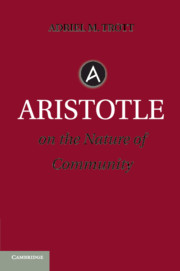
- Cited by 8
-
Cited byCrossref Citations
This Book has been cited by the following publications. This list is generated based on data provided by Crossref.
Barbato, Mariano 2016. What kind of person is the state? The pilgrim as a processual metaphor beyond the Leviathan. Journal of International Relations and Development, Vol. 19, Issue. 4, p. 558.
Cohen de Lara, Emma 2017. Aristotle’s Practical Philosophy. p. 13.
Knoll, Manuel 2017. Aristote, l’animal politique. p. 31.
Chen, Siyi 2018. Aristotle on the Senses of Nature and the Naturalness of the City. Mnemosyne, Vol. 71, Issue. 6, p. 993.
Ağırman, Ferhat 2018. HOBBES VE ROUSSEAU’NUN DEVLET KURAMLARINDA DOĞA DURUMU. Pamukkale University Journal of Social Sciences Institute,
Frank, Jill 2019. Athenian democracy and its critics. Ethnic and Racial Studies, Vol. 42, Issue. 8, p. 1306.
Russell, Jesse 2022. Aquinas on Kinship and Caritas. New Blackfriars, Vol. 103, Issue. 1107, p. 622.
Bhorat, Ziyaad 2023. Digital Despotism and Aristotle on the Despotic Master–Slave Relation. Philosophy & Technology, Vol. 36, Issue. 4,
- Publisher:
- Cambridge University Press
- Online publication date:
- November 2013
- Print publication year:
- 2013
- Online ISBN:
- 9781139567206




